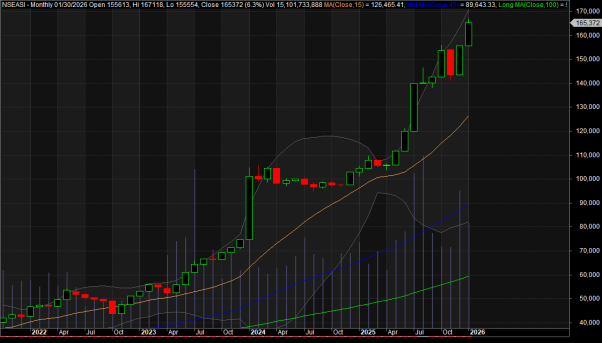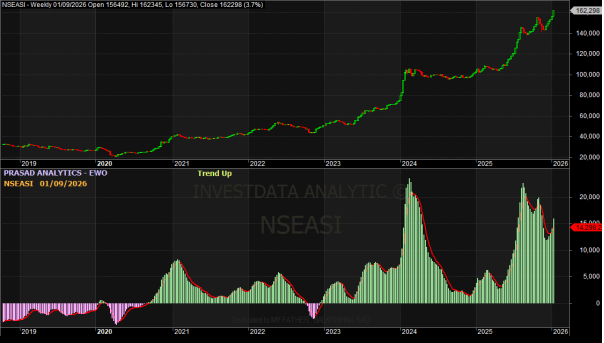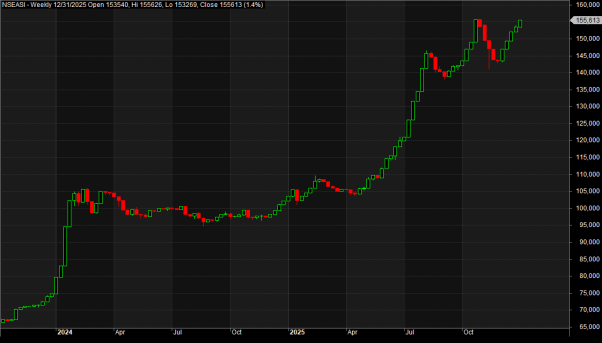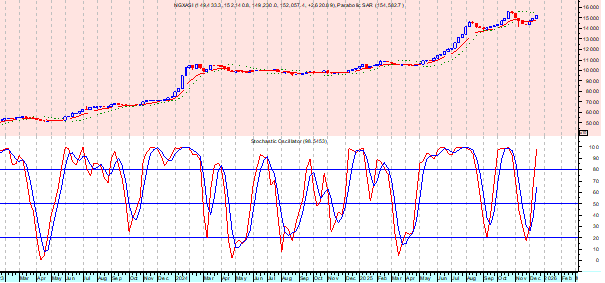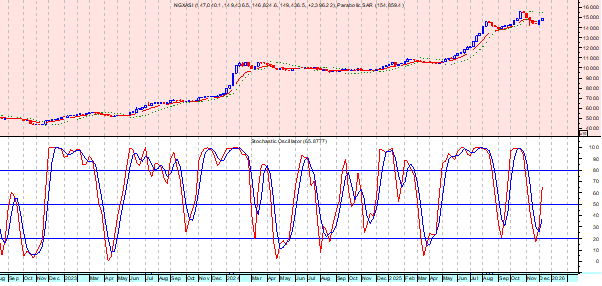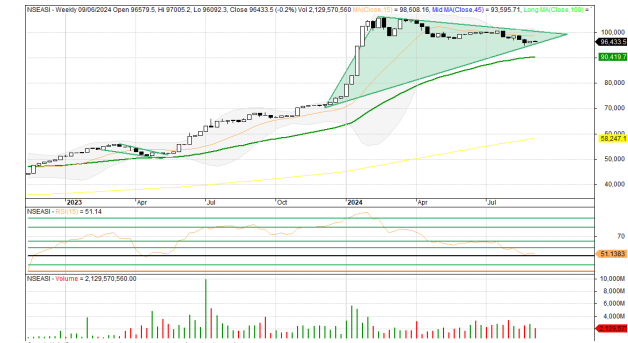
The Nigerian equity market recorded a marginal 0.15% decline last week, resulting in investors losing approximately N83bn from their portfolios, while the All-Share Index (ASI) closed at 96,433.53 basis points, and cutting market capitalization to N55.394tr.
During the period, a total of 2.141bn shares valued at N51.22bn were traded across 55,603 individual transactions or deals.
Despite the overall market decline, the Oil and Gas sector distinguished itself as the strongest performer for the week, achieving a week-to-date return of 1.52%, a performance that contrasted sharply with the Insurance sector which experienced the most significant decline of 4.45%. Over the quarter, the market has faced a downturn with a negative return of 3.62% so far, while year-to-date returns remain positive at 28.97%.
Among the week’s top gainers was Industrial and Medical Gases Nigeria Plc, which saw a remarkable increase of 32.58% as its share price closed at N35.00 each, followed by Berger Paints’ 31.12% to close at N18.75, while E-Transact gained 20.59% to end at N6.15. UACN Plc also saw a significant 19.77% rise, closing at N20.90, while C&I Leasing increased by 18.57%, ending at N4.15.
Conversely, the major decliners included RT Briscoe, which continues to experience a bull trend in August, but fell by 27.61%, closing at N2.57 per share. Other significant losers were FTN Cocoa which lost 18.38% to close at N1.51, Omatek Ventures dropped 18.18% to N0.72, The Initiate shed 13.18% to end at N1.91, and Cornerstones, which dropped by 12.59% to close at N2.36.
The performance of Nigeria’s equities market reflects the broader global market trends. During the same period, international stock markets also experienced declines. For instance, Nvidia, a prominent technology company, saw a substantial drop in its market capitalization, which is now valued at $2.522 trillion. Nvidia’s stock price has fallen to $102.49, reflecting broader challenges in the tech sector.The MSCI All-Country World Index, which provides a comprehensive view of global stock performance, fell by 1.33%, closing at 801.88. Over the week, the index experienced a significant decline of 3.9%, marking its deepest drop since the week beginning July 29. In the United States, major indices also reported negative performance: the Dow Jones Industrial Average decreased by 1.01%, closing at 40,345.41; the S&P 500 fell by 1.73%, ending at 5,408.42; and the Nasdaq Composite experienced a 2.55% drop, closing at 16,690.83. In Europe, the STOXX 600 index closed down by 1.1%, reflecting broader market weaknesses. Additionally, Germany’s DAX index saw a decline of 1.5% following reports that the country’s industrial production had fallen by 2.4% in July. This decline in industrial production highlights the ongoing economic challenges faced by major European economies.
In the forex market, the naira showed a significant rebound, closing at N1,593.32 per dollar. This represents a 2.89% recovery after three consecutive days of depreciation. The rebound reflects the Central Bank of Nigeria’s (CBN) recent intervention strategies aimed at stabilizing the naira and improving market liquidity.
In response to pressures in the forex market, the Central Bank of Nigeria (CBN) has implemented a new policy aimed at improving forex liquidity. The CBN has authorized the sale of $20,000 each to Bureau De Change (BDC) operators at a fixed rate of N1,580 per dollar. BDCs are instructed to sell to eligible users with a margin no greater than 1% above this purchase rate. This measure is designed to stabilize the naira, control import costs, and ensure that end-users benefit from reduced transaction costs. By enhancing forex liquidity and stabilizing the currency, the CBN aims to boost investor confidence and attract foreign investment, contributing to overall economic stability.
In the fixed income sector, there has been a notable decline in yields across various tenors. Specifically, yields on 91-day, 182-day, and 364-day instruments fell by 1.2%, 1.7%, and 1.96%, respectively. This downward trend in yields indicates that investors might be seeking alternatives to fixed income securities, potentially due to concerns about debt sustainability and the attractiveness of other investment opportunities.
Additionally, FBN Holdings Plc has announced a significant strategic move by deciding to sell its entire stake in FBNQuest Merchant Bank Limited to EverQuest Acquisition LLP. This divestment is part of a broader strategy to optimize the company’s portfolio and could have notable implications for the financial sector.
NGXASI Weekly Chart
Looking ahead, the Nigerian equities market is approaching a crucial technical level: the 8-day moving average, also known as the T-line. A breakthrough above this resistance level could signal the onset of a bullish trend. The current market’s money flow index stands at 41.29, suggesting that there is a reasonable amount of capital invested in the market, with expectations for additional funds to flow in as yields in the fixed income sector decline. The Relative Strength Index (RSI) is at 50.5, indicating that the market is currently in a neutral zone, neither overbought nor oversold. This neutral RSI reading suggests that the market could move in either direction depending on future developments, including investor sentiment and macroeconomic factors.
In summary, while the Nigerian equities market mirrors some global trends, recent policy measures and market dynamics create a complex but potentially favorable environment for investors. The market’s technical indicators, combined with recent policy interventions, suggest that there may be opportunities for growth if key resistance levels are surpassed. Stakeholders should remain informed about ongoing market developments and adjust their strategies accordingly to navigate the evolving investment landscape effectively.
INVESTDATA Q4 MASTER CLASS
Theme Understanding The Complete CODE For Making Money & Predicting Market Turns
Sub-Topics
- The Power of Market Timing & Momentum Trading in Any Cycle
- Discovering Support and Resistance Levels On NGX with Candlestick Patterns For Profitable Trading,
- Understanding Macroeconomic Data for Sector Rotation & Position Taking
- Importance of Numbers in Profitable Trading & Stock Picks
Date: September 28. 2024
Time: 9AM Prompt
Fee: N70,000 per participant
Venue: ZOOM
However, with less than 27 days to Q4 Master Class September, 2024, you need to make money and avoid losses, boost your trading bottom line. Don’t miss this opportunity.
During this practical session our top industry experts will reveal profitable trade ideas and opportunities in Q4 to consolidate your gains and ride on year end seasonality to maximize returns. That is what you can implement immediately to start tracking the result by yourself and the investdata Research team on your behalf. You definitely want to be among the smart traders and investors in Q4. So, send “YES” or “STOCKS” to 08028164085 and 08179547605.
Ambrose Omordion
CRO|Investdata Consulting Ltd
info@investdata.com.ng
ambrose.o@investdataonline.com
ambroseconsultants@yahoo.com
08028164085






